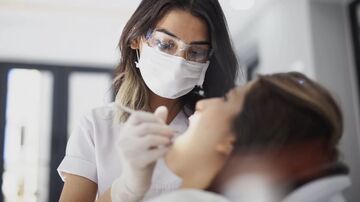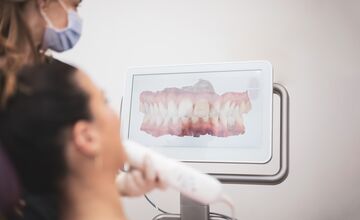
Private Checkup In Warwick
Benefits of a private checkup
-
State of the art practice
-
Local independent practice
-
Highly experienced clinicians
-
Taking on new patients
Affordable and accessible dental care is now available in Warwick. If you’ve been struggling to see a dentist, choosing private treatment could be the ideal way to get your oral health back on track.
Our routine dental checkups include everything you need to protect your oral health and prevent more widespread problems. We help to identify the early signs of gum disease and tooth decay, so you can avoid more extensive treatments that might more more expensive and more invasive.
What is your dentist looking for?
Red and inflamed gums are some of the first signs that you have an issue with gum disease. We can help to spot these signs and take steps to put this right.
Spotting decay early can help to avoid the need for extensive treatments like fillings and root canal therapy.
Oral cancer screening is an essential part of the routine checkup. It's a small but important step that can help to detect oral cancer early.
If you have problems with your bite, these can cause widespread health problems. Routine checkups can help to spot changes to your bite that could be addressed with othodontics.
What happens during a checkup?
During a routine checkup, we have a check list of items that we look for. We will examine your teeth and gums to look for signs of decay or other common issues. If we require a more in-depth look, we'll take X-rays to see your mouth structures in more detail. We also carry out essential oral cancer screening. Every routine checkup is tailored to your needs, and you'll also have a chance to ask questions about your oral health or any other treatments you might be considering.

Related treatments
The importance of regular checkups
Dental decay can quickly spread and cause irreversible damage to your teeth and supporting structures. With regular checkups, we can identify small issues and stop them from becoming much worse. A routine dental checkup is also an excellent time to ask questions about caring for your teeth at home, so you can be confident you're doing everything you need to do to keep your teeth and gums healthy.


Meet
our team
Get to know the team behind the treatments. We are proud to have built a team of experts and industry leaders. Meet the dental surgeons, dentists, dental nurses and support staff that will help support you on your journey to better oral health.
About the team
What to expect from your treatment journey
We want you to feel empowered and informed every step of the way. Understand what to expect during your treatment with this simple guide. Your exact treatment plan might change, but this will be explained during your consultation.

Private checkups are more widely available than NHS checkups, which means you can access care quickly and at a time to suit you.
We start with a through examination of your teeth and gums to check for signs of decay or gum disease. We can then discuss your oral health habits and help you to identify ways to take better care of your teeth at home.
A routine checkup is the ideal time to ask questions about your oral health and any treatments you might be considering.

Frequently Asked Questions
It’s common to have lots of questions about your treatment. We’ve answered some of the most popular questions below.
There's no time like the present! If you haven't been to the dentist for a while, don't let this put you off treatment. We offer a friendly and relaxing environment for your dental checkup. We know there are many reasons you might miss your dental checkups and offer a judgement-free zone for you to get your oral health back on track.
A dental checkup will usually include a complete examination of your mouth and gums. It may also include an X-ray, if this is clinically required. It could also include a fluoride treatment to help seal and protect your teeth.
We recommend visiting the dentist every 12-24 months, but some people may need to visit more often. For example, if you have active gum disease, you may need to visit the dentist more often until this is under control.



